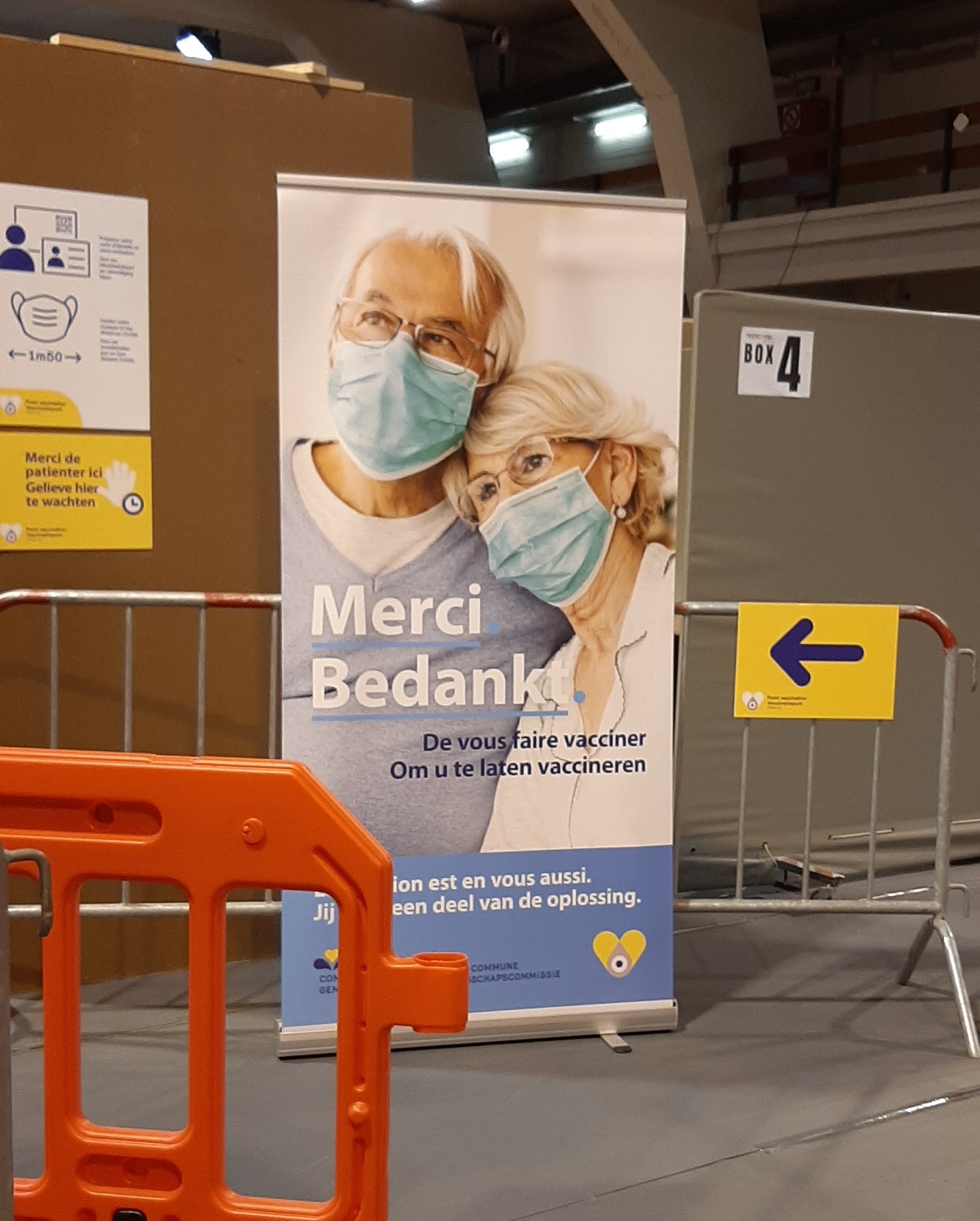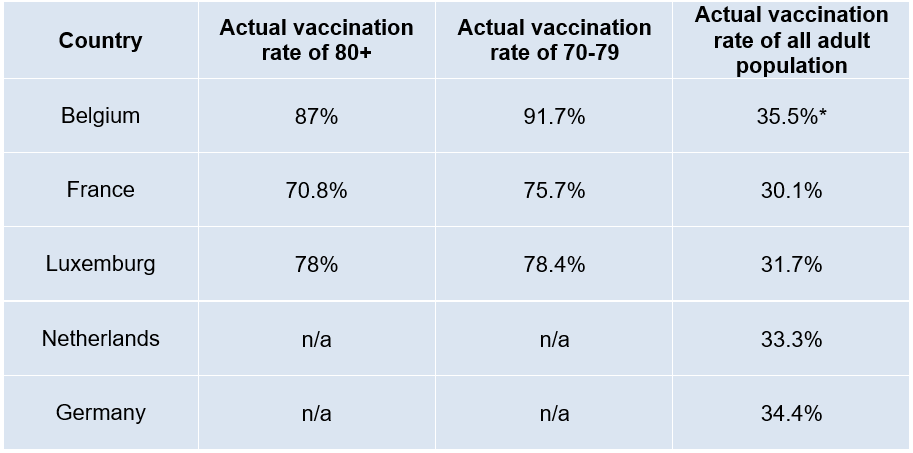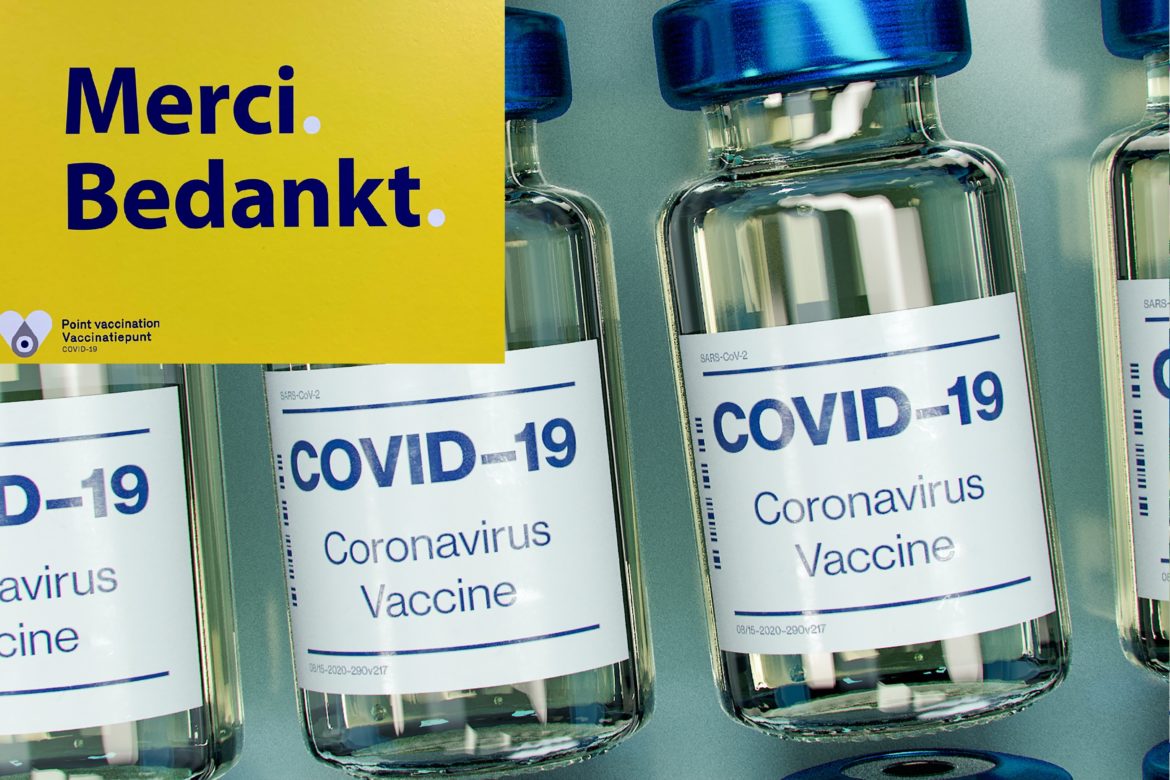QUENTIN GENARD
More than 37% of adults living in Belgium got at least one dose of COVID-19 vaccine (and 11.5% are fully vaccinated). Belgium is amongst the countries progressing most quickly with the vaccination program in Europe[1]. The vaccines bring great relief to a country with the highest accumulated Covid-related death rate in Europe during the first wave of the pandemic. This number has to be put back in context considering the large definition of COVID-19 related deaths used by the authorities.
Vaccines
The Belgian federal government has ordered vaccines only in the framework of contracts negotiated by the European Commission. The following vaccines are therefore available in Belgium: AstraZeneca (7.5 million doses), Janssen (Johnson & Johnson – 5m), Pfizer/BioNTech (5m) and Moderna (2m). Belgium has also bought 2.9 million CureVac doses but they are not yet available.
As of 9th May, Belgium has received 5,029,005 doses of all authorised vaccines, of which 4 490 660 doses have already been administered. It takes about one week between delivery and the administration of the vaccine.
Citizens cannot choose which vaccine they would receive. The rationale being that all vaccines have been approved by the European Medicines Agency and should therefore all be treated equally to avoid vaccine elitism. The AstraZeneca vaccine is the only one with a reduced usage. Following a few rare cases of blood clots in Europe, the government is limiting the distribution of this vaccine to citizens over 41 years old[2].
Vaccination strategy
 Belgium’s vaccination strategy was drawn up in July 2020 by the High Health Council, a independent body advising the federal government. The main aim of the strategy is to limit the casualties from COVID-19, therefore Belgium’s strategy put a heavy focus on the most vulnerable groups with the explicit objective of vaccination as many citizens as possible belonging to them. While this strategy is also adopted by other European countries, Belgium governments are stricter than others when it comes to vaccine availability. France is about to open vaccination to all general population for ‘left-over doses’, while Poland has already opened it to all adults. According to the Belgium’s schedule this will open only in June.
Belgium’s vaccination strategy was drawn up in July 2020 by the High Health Council, a independent body advising the federal government. The main aim of the strategy is to limit the casualties from COVID-19, therefore Belgium’s strategy put a heavy focus on the most vulnerable groups with the explicit objective of vaccination as many citizens as possible belonging to them. While this strategy is also adopted by other European countries, Belgium governments are stricter than others when it comes to vaccine availability. France is about to open vaccination to all general population for ‘left-over doses’, while Poland has already opened it to all adults. According to the Belgium’s schedule this will open only in June.
The vaccination started in care homes and hospitals as in other countries. It was then extended to first line responders such as General Practitioners and pharmacists before opening to all 65+ citizens. The general population with comorbidities could also be vaccinated from April onwards. The rest of the general population will be invited to get vaccinated from June at the latest.
The strategy was based on statistics from the hospitalisation rate of the first wave. 90% of deaths linked to COVID-19 and one person out of two admitted in intensive care units (ICU) was 65+. For the citizens aged up to 65 and still admitted in ICU, 65% had at least one comorbidity. So naturally these became the priority targets for the vaccination.
In Belgium only when the vaccination target in one group is reached, that the vaccination is open to the next group. The slow but methodical roll-out leads the country to have better vaccination numbers (in specific age group) than its neighbours, and most EU member states (there is no official data for Germany and The Netherlands concerning elderly population in the ECDC database).
Table 1. Vaccination rate of elderly population in chosen countries (vaccinated with at least 1 dose, as of 9 May 2021)

Vaccines produced in Belgium
Belgium has established a long time ago part of its economic strategy around vaccines and the chemical sector. The chemical sector is the biggest industrial sector in Belgium, and accounts for one third of Belgian exports. Belgium was responsible for more than 10% of all pharmaceuticals exports outside of the EU even before the COVID-19 pandemic.
The Pfizer and AstraZeneca COVID-19 vaccines are both produced in Belgium – country with population ca. 11-million. Around 70% of the vaccines exported outside of the EU are coming from Belgium. The importance of the vaccines export also explains the position defended by Prime Minister Alexander De Croo during the European Council of March 2021. As the Commission was testing the political appetite to subject to export licence vaccines, Belgium was one of the countries calling for caution and allowing for continuous export.
One of the benefits of the centralised approach by the Commission in case of COVID-19 vaccination strategy is the absence of serious calls or debate on a ban of exports to other EU member states. In 2020, Belgium has for instance banned the export of flu vaccines to the rest of the EU by fear of lacking supplies. This conversation has simply not taken place concerning COVID-19 vaccines because they tend to be perceived as European vaccines rather than Belgian ones, despite their origin. It is one of these examples where the EU approach has effectively squashed any nationalistic reflex.

Regionalisation of vaccination
Belgium being Belgium, health is one of these policy areas that does not belong only to the federal government. The vaccination program is implemented by regions (Flanders, Wallonia, Brussels, and the German-speaking territories). Each region is responsible for rolling-out the vaccine programme. They are responsible for inviting citizens to get vaccinated, public communication and setting vaccination centres but there is however no difference between regions about the type of vaccination or the priority categories.
This leads to a somewhat heterogeneous vaccination. Flanders and Wallonia are close to having given the first dose to 40% of adults while Brussels is trailing behind with 31%. For the 55-64 category, only 40% of Flemish got the first dose of the vaccine already while it is almost 60% in Brussels and Wallonia.
In conclusion, roll-out in Belgium does not suffer from Belgium’s complicated governance. The country has chosen to play by the European rules despite the competitive advantage it has built over the years. The choice of vaccination per stage makes for a slow roll-out, but it is effectively protecting the most vulnerable population.
[1] EU average: 31.3% 1st dose; and 11.9% – 2 doses; data from 8 May 2021
[2] There was a period in which it was limited to citizens over 55 years old. Vide Le Soir.BE
Photos used in article: Vaccination and test center in Brussels, Q. Genard, cover/vaccines – Daniel Schludi on Unsplash;
Przeczytaj też:
B. Marcinkowska, Szczepienia przeciwko COVID-19: Francja
J. Tołczyk, Szczepienia przeciwko COVID-19: Niemcy
J. Graca, Szczepienia przeciwko COVID-19: Wielka Brytania
Pozostałe artykuły z serii Szczepienia przeciwko COVID-19
K. Dąbrówka, Rządowa pomoc dla przedsiębiorców w czasie pandemii COVID-19 – przypadek Francji, Belgii, Hiszpanii i Włoch, Biuletyn Analiz CIM nr 14/2020

